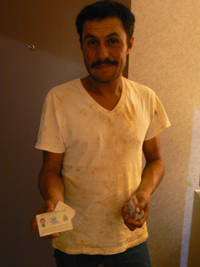There is no doubt that complexities will arise when you are a journalist from Arizona working on a story dealing with the Latino population. Due mainly to its new immigration law, our state is facing numerous challenges in court, a battle with the federal government, a lot of media attention and economic boycotts. All of this can cause some complications when working on a story like mine — an in-depth, multimedia project that looks at the enforcement of employer sanction laws.
Example One
During my pre-reporting and attempts at setting up interviews for a trip to South Carolina, I was turned down by a business that had received a violation for not following state law.
“With everything going on in Arizona and this request coming from an ASU student, I’m going to respectfully decline,” the potential interviewee stated in an e-mail.
In this situation I was dealing with a PR person as the intermediary between me and the person I was trying to interview. This did not allow for direct communication. I called her back asking her to let the business owner know that I was trying to learn about South Carolina’s law, not Arizona’s. However, the effort was futile and failed. No interview took place.
Example Two
A group of migrant workers lived in the hotel where I was staying. I approached them to explain my project and my desire to share their stories. At first, they said that they couldn’t speak English well or that they were fearful of their boss seeing the final product, which could mean losing their jobs.

'Johnny' -- a migrant worker we met in South Carolina.
After speaking to my News21 editors, we came up with another approach. The goal was to gain their confidence by stressing the importance of sharing their stories so that the public could obtain a better understanding of the situation of migrant workers in the United States.
After many casual conversations with the workers at the hotel over a two-day period they gained enough confidence to speak to me. One of the men, Mr. Flores, who is from Mexico City and received his citizenship a year ago, agreed to a video interview. Thereafter, many of his colleagues approached me to just talk about their situation and answer my questions. They realized I was sincerely interested in their stories.
Eventually, I found myself speaking with “Johnny” who freely shared his opinions. He did ask for my views on occasion, but I learned to just turn the question back around, asking him “What do you think of that?” At the end of our interview, I had gotten to know Johnny so well that I was allowed to take a few pictures of him.
It is important to note that the two men mentioned above are documented workers who are in the country legally. Speaking with undocumented workers can be even more challenging.
In the end, during my time out in the Palmetto State I realized that, as a journalist dealing with a very touchy subject, I must be willing to approach sources in sincere and open way — and be patient while building relationships. By taking the time to get to know these people, I was eventually able to do the reporting I wanted to do.

